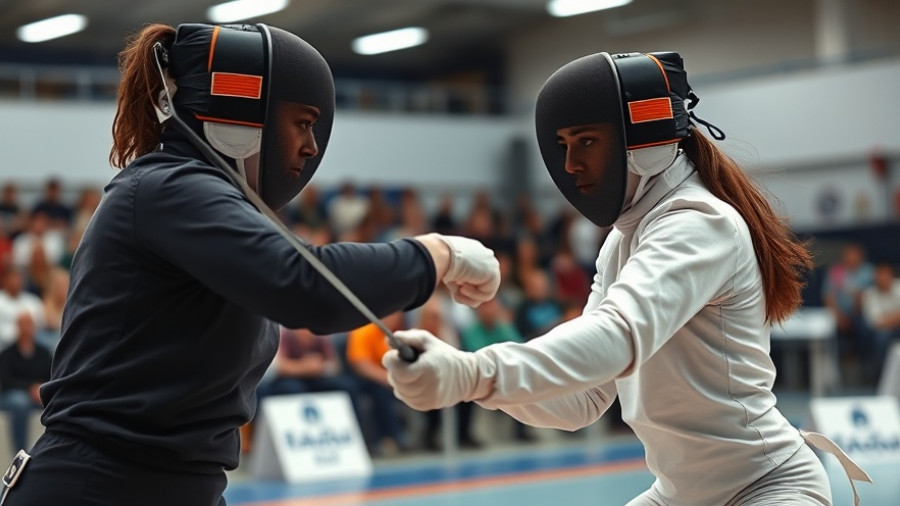
Understanding the Title IX Debate in Sports
The recent lawsuit against USA Fencing has thrust the issue of transgender athletes competing in women’s sports into the national spotlight. At a fencing tournament held at Bartle Hall, three female fencers contend that allowing transgender women to compete was a violation of Title IX, the federal law that prohibits sex-based discrimination in educational programs and activities funded by the federal government. This situation reflects broader societal questions surrounding equity in sports, particularly regarding women's rights and the inclusion of transgender individuals.
In 'Lawsuit: USA Fencing violated Title IX by allowing trans athletes to compete in KC,' the discussion dives into the ongoing debate about fairness and inclusion in sports, prompting us to explore its wider implications within our local community.
The Voices Behind the Lawsuit
Among the plaintiffs is a Libyan fencer who argues that cisgender women find themselves at a disadvantage when forced to compete against transgender women. “It shouldn’t happen in the first place,” she stated, emphasizing the perceived powerlessness among biological female athletes in such competitions. According to her, the essence of fair play is at stake, suggesting that competition among women should occur in an environment devoid of major disparities in biological advantages.
The Impact of Withholding Information
Central to this legal challenge is the allegation that USA Fencing failed to inform competitors about the participation of transgender athletes in the women’s division. The lawsuit claims this lack of transparency jeopardizes the integrity of the competition and leaves female competitors in a position of disadvantage due to unlevel playing fields. The idea is that if athletes do not have clear information about their competitors, they cannot fairly prepare or strategize for their matches.
Perspectives on Fairness and Inclusion
Advocates for trans equality argue that the lawsuit is less about fairness for women and more about politically driven exclusionary practices. Sky Willingham, a spokesperson for transgender rights, asserts that the narrative of fairness often overlooks the rights of transgender athletes, who are already marginalized in sports. "The implementation and motivation of these barriers is not really about achieving fairness for women’s sports,” she said. This perspective raises the question of how society defines fairness and competition in sports within a changing landscape of gender identity.
The Federal Funding Angle
USA Fencing receives federal funding, and this fact links the organization’s policies directly to Title IX implications. The argument posited by the plaintiffs relies heavily on federal legal standards of non-discrimination, suggesting that by accepting federal funds, organizations have an obligation to uphold equitable treatment across all gender identities. The crux of the debate centers on how Title IX should be interpreted in the context of evolving definitions of gender and participation in sports.
Community Impact and Local Conversations
Locally, the Kansas City community is witnessing passionate discussions as this legal battle unfolds. For many residents, especially those invested in promoting women's sports and gender equality, the outcome of this lawsuit could set vital precedents affecting local tournaments and athletic programs. Emphasizing this concern, the fencers involved are reflecting broader sentiments within Kansas City neighborhoods, where individuals and families are grappling with what fair play means in sports.
Looking Forward: Possible Future Trends
As we consider future implications, this lawsuit might be a catalyst for wider legislative discussions concerning gender rights in sports. The National Center for Lesbian Rights and local advocacy groups will likely continue to rally behind policies that ensure equality for all athletes, regardless of gender identity, as the landscape of competitive sports evolves. The tension between inclusion and perceived fairness is likely to shape many future athletic policies and regulations.
Actionable Insights for the Community
For local residents and business owners in Kansas City, staying informed about these developments is essential. Engaging in community discussions, participating in local events, and understanding the varied perspectives on this issue can foster dialogue that promotes inclusiveness—and a balanced approach to community values. As these relevant themes unfold in neighborhoods across KC, involvement in the larger conversation can help shape the future of local sporting events and community engagement.
Ultimately, the Kansas City community must navigate the complexities surrounding gender identity and fairness in sports. The lawsuit against USA Fencing is not just a legal battle; it’s a reflection of the values, challenges, and ongoing dialogue in our society about inclusion and equality.
Have a story to share or want to contact us for more details? Drop us an email at team@kansascitythrive.com.
 Add Row
Add Row  Add
Add 




Write A Comment